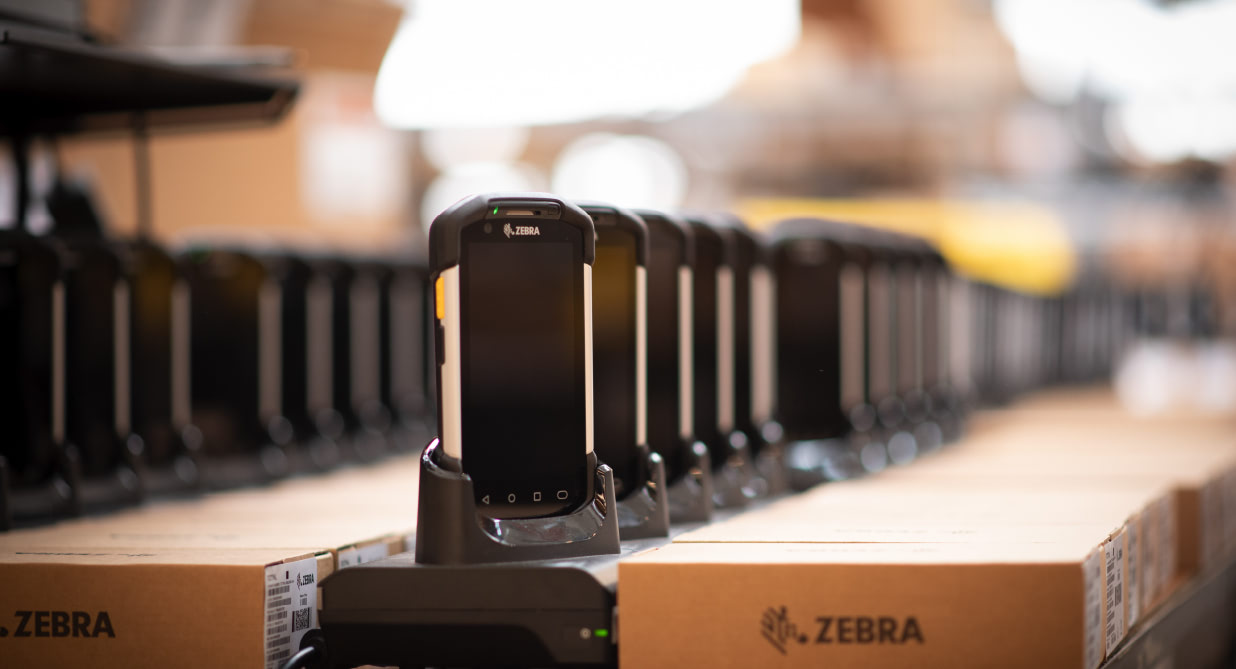Industries We Serve

DecisionPoint Technologies empowers industries with real-time visibility and precision solutions
DecisionPoint Technologies equips leaders across high-volume, high-demand industries with real-time visibility and the tools you need to transform operations, delight customers, and achieve your business goals.
From real-time inventory management and automation to IoT-enabled capabilities, our technology solutions help streamline processes, reduce costs, and inform operations with the data you need—at every critical decision point.
Explore how we’re making an impact in your industry with unparalleled insights, service, and expertise in supply chain, enterprise mobility, asset management, automation, and point-of-sale solutions.
Supply Chain & Logistics
Optimize every step from warehouse to final delivery
Distribution leaders understand that accuracy, timing, and scalability are critical—and so do we. Precision and efficiency are essential to meeting customer expectations and maintaining profitability. Any misstep, from inaccurate inventory counts to inefficient fleet deployment, can result in costly delays and dissatisfied customers.
Let us provide the expertise and solutions you need to streamline operations, enhance visibility, and keep every link in your supply chain running smoothly. With our support, you can:
- Gain real-time, end-to-end visibility into inventory and shipments across all locations
- Automate workflows for receiving, picking, packing, and shipping
- Leverage predictive analytics to improve resource allocation and scaling
- Optimize operations with managed mobility services that keep devices, networks, and systems up and running smoothly 24/7
We help you achieve seamless operations from the moment inventory arrives to its final destination, empowering your teams to solve challenges and handle high volumes with accuracy and agility.
Supply chain and logistics challenges we help solve
Solution: IoT-based inventory tracking solutions can deliver real-time item status and instant verification, reducing errors and speeding up the fulfillment process to meet high customer standards and delivery deadlines.
Solution: Data-driven labor forecasting, intuitive devices and software interfaces, and 24/7 support help ensure efficient scaling on demand without eroding profit margins.
Solution: Fleet optimization tools maximize asset utilization, streamline tracking and reporting, and reduce downtime to support faster, more accurate operations and optimal use of every resource.
Ready to transform your supply chain and logistics processes?
Contact us today to talk about your specific challenges and how a customized solution can help streamline your operations from end to end.
Manufacturing Solutions
Streamline operations and support quality on the production floor and beyond
In manufacturing, waste and downtime aren’t an option—even minor inefficiencies can add up to costly delays and quality concerns. With expert guidance and solutions from DecisionPoint Technologies, you can:
- Gain accurate, real-time, end-to-end visibility into assets and inventory
- Automate monitoring for work-in-progress
- Support seamless, streamlined, and automated production workflows
- Integrate new technologies with existing tech stacks
- Offload device management, help desk support, and system maintenance with managed IT services, freeing your teams to focus on core operations
Our IoT-enabled solutions give manufacturers a clear view into assets, resources, and production workflows, empowering leaders to enhance production processes while reducing waste and downtime. Our experts can design and implement systems that support collaboration and transparency between trade partners, reducing compliance risks and minimizing shipping penalties.
From traceability to automation, we’re here to be your trusted partner, putting technology to work supporting your people.
Manufacturing challenges we help solve
Solution: Real-time asset tracking solutions enable proactive resource management, so every critical piece of equipment is utilized efficiently—and available where it’s needed most.
Solution: RFID-enabled, automated data capture supports the comprehensive, secure recordkeeping required to address regulatory audits with confidence, and safeguard against reputational threats.
Solution: IoT-enabled inspection solutions automate quality checks, capturing real-time data and alerting teams to anomalies. Ensure consistency, minimize the risk of defects, and maintain the high standards your customers expect.
Solution: Automated data capture reduces the need for manual input, and enables faster, more informed decision-making, helping production supervisors keep workflows efficient and respond quickly to issues.
Solution: With managed services, device procurement, deployment, maintenance, and support are always-on, ensuring production teams have reliable technology tools without burdening internal IT staff.
Need help addressing your manufacturing supply chain challenges?
We don’t shy away from complexity—reach out today, and an expert will be in touch to arrange a free consultation at a time that’s convenient for you.
Retail Solutions
Deliver seamless shopping experiences across every retail environment
From department stores to convenience and grocery stores, each retail environment has unique demands, but they all share a common need for speed, accuracy, and convenience. Satisfied, loyal customers drive revenue—so retailers need solutions that deliver a unified experience across all channels:
- Gain real-time, cross-channel inventory visibility
- Enhance customer experiences with streamlined checkouts and accurate stock levels
- Improve stock accuracy and reduce shrinkage with RFID and IoT-enabled tracking
- Enable flexible in-store and online fulfillment options
- Lighten the workload for retail associates and IT teams
Plus, our managed IT services ensure your technology ecosystem—from mobile devices to POS systems—stays current, secure, and reliable across all locations, with 24/7 support when you need it.
Get expert insights into maximizing return on your retail tech investments by downloading our 2025 report.
Retail challenges we help solve
Grocery and food retail
Solution: IoT sensors and RFID-enabled systems track storage conditions like temperature and expiration dates in real-time, reducing spoilage and supporting compliance with food safety standards.
Solution: Predictive analytics optimize staffing and inventory replenishment, ensuring shelves are stocked and checkout lines move efficiently during high-demand periods.
Solution: Automated tracking solutions capture key data elements and critical tracking events, providing real-time traceability and instant reporting capabilities for audits or recalls.
Solution: Modern POS systems with mobile and self-checkout capabilities speed up transactions, reduce bottlenecks, and improve the overall customer experience for shoppers.
Apparel / fashion
Solution: Predictive analytics and RFID-enabled inventory tracking help retailers align inventory with demand, minimizing excess stock and shortages.
Solution: Unified inventory management systems provide real-time visibility, ensuring smooth BOPIS (Buy Online, Pick Up In Store) and delivery operations.
Solution: Integrated RFID and IoT-enabled inventory systems provide real-time stock visibility, ensuring accurate picking and reducing errors that lead to lost sales and returns.
Solution: Inventory and asset tracking solutions provide detailed, real-time insights into inventory and product movements, enhancing security and accountability.
Hospitality
Solution: Mobile POS and table-side ordering systems enable faster, more accurate service, improving speed and ensuring a better guest experience.
Solution: RFID-enabled asset tracking ensures real-time visibility, reducing loss, and ensuring critical items are always available.
Solution: Workforce management platforms optimize scheduling and track labor costs, ensuring efficient resource allocation during busy periods.
Solution: Centralized CRM systems integrate with IoT devices, collecting and analyzing data to personalize offerings and build customer loyalty.
Specialty retail
Solution: IoT-based inventory tracking systems ensure item-level visibility, optimizing stock levels for specialized and unique products.
Solution: RFID-enabled asset tracking and mobile POS tools empower staff to offer personalized recommendations and service.
Solution: Integrated CRM and analytics platforms capture customer data, enabling tailored promotions and loyalty programs for niche markets.
Solution: Cross-channel fulfillment systems enable real-time inventory updates, streamlining both online and in-store sales.
Looking to streamline retail operations and enhance the customer experience?
Contact us today to explore how DecisionPoint’s solutions can help elevate your operations and drive loyalty.
Healthcare Solutions
Empowering patient care with technology and support
In the healthcare sector, precision and efficiency are paramount to delivering exceptional patient care. DecisionPoint Technologies offers tailored solutions that address the unique challenges faced by healthcare providers, ensuring seamless operations and enhanced patient outcomes:
- Track medical equipment, supplies, and patient belongings in real-time
- Simplify adherence to healthcare regulations with automated data capture and secure record-keeping
- Enable caregivers to spend less time on administrative tasks and more time focused on patient care
- Reduce wait times and minimize disruptions with optimized workflows and seamless coordination
- Prevent inventory waste and reduce operational inefficiencies through IoT-enabled monitoring and predictive insights
By integrating these advanced technologies, DecisionPoint Technologies empowers healthcare organizations to optimize their operations, maintain compliance, and focus on delivering high-quality patient care.
Healthcare challenges we help solve
Solution: RFID and IoT-based tracking systems provide real-time visibility of medical assets, ensuring that essential equipment is readily available when needed.
Solution: Adopting mobile computing solutions enables healthcare staff to accurately capture and access patient data at the point of care, reducing errors and freeing up time for patient interaction.
Solution: Automated data capture and record-keeping solutions streamline compliance processes, ensuring adherence to healthcare standards and reducing administrative workloads.
Solution: Automating the tracking of patient belongings through digital records and photographic documentation enhances accountability and reduces the risk of lost items, enhancing patient care and trust.
Ready to streamline operations and improve patient care across your healthcare facilities?
Contact us today to explore tailored solutions for your unique healthcare needs. Our experts are ready to help!
Why DecisionPoint Technologies?
DecisionPoint Technologies provides scalable, reliable solutions to solve your toughest challenges without adding complexity.
With decades of expertise in healthcare, retail, logistics, and manufacturing, we collaborate to understand your needs and build systems that evolve with your business. From real-time inventory tracking to automated compliance and enhanced operational visibility, our solutions drive efficiency and growth.
Our managed IT and mobility services ensure systems run seamlessly, allowing your team to focus on core goals.
Whether improving patient care, streamlining retail, or optimizing your supply chain, DecisionPoint delivers tools to meet today’s demands and prepare for tomorrow’s opportunities.

Ready to discover what’s possible and begin your operational transformation?
Partner with us to simplify processes, boost productivity, and turn challenges into growth.